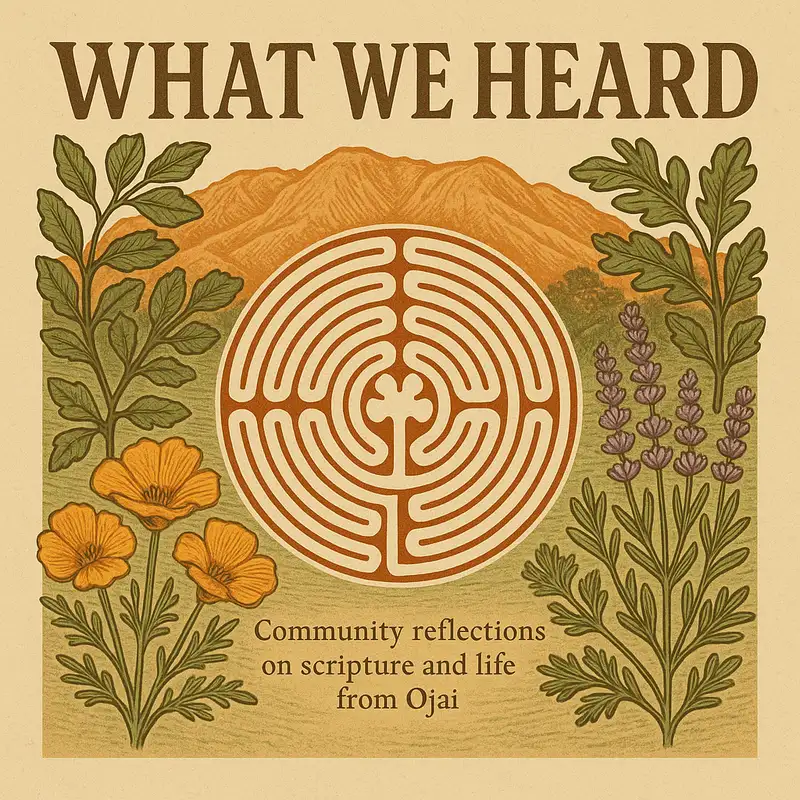 Episode 6
Episode 6
· 08:27
This morning, we step into the Season of Creation.
A time when the Church lifts its eyes to the world around us:
the soil beneath our feet,
the water that nourishes,
the air that fills our lungs,
and the creatures who share our life.
This isn’t a side trip from the Gospel.
It’s the Gospel lived in the flesh of creation.
To follow Jesus is to live faithfully in our watershed —
awake to the gifts and the wounds of the land.
In Deuteronomy, Moses stands with the people
at the edge of the Jordan River, their watershed.
He sets before them a choice:
life and blessing, or death and loss.
“Choose life,” he says,
“so that you and your descendants may live —
loving God, obeying God, holding fast.”
That choice is not abstract. It’s ecological.
To choose life is to live in ways that sustain the land
and make room for future generations.
To choose death is to exploit, to poison, to fracture.
Moses makes it clear:
our life with God cannot be separated
from our life with the soil, the waters,
and the generations yet to come.
The psalmist gives us a picture of what that looks like:
the righteous “are like trees planted by streams of water…
their leaves do not wither.”
A tree rooted in God’s living Word flourishes
and gives life in turn — offering fruit, shade, and shelter.
So that is our calling in this Season of Creation: to be like trees.
Hold onto that image of the tree as we turn to the Gospel.
The words of Jesus can sound severe — even unsettling.
He speaks of discipleship in a way
that cuts right through our loyalties and our certitudes.
At its heart, he is saying: to follow him is to let go.
To release the grip we keep on family expectations,
on possessions, even on the stories we tell about ourselves.
Think again of the tree.
It does not clutch its leaves; they fall in season.
It does not hoard water or sunlight;
it receives and shares freely.
Its roots intertwine with others;
its branches stretch out into open air.
Discipleship is like that —
a loosening, an opening, a readiness
to give ourselves into God’s renewing work.
And in his letter to Philemon,
Paul shows us what that loosening can look like in practice:
He urges a slaveholder to release control —
to receive Onesimus not as property but as a brother.
The Gospel breaks the logic of possession and control.
If even slavery can be reimagined as kinship,
then surely our relationship with the earth can be reimagined too —
not possession, but belovéd community.
Later today, we will embody that in a small act of remembrance.
After worship, you are invited to paint a rock
with the name of someone you grieve,
and place it in the garden.
It’s a way of entrusting memory to the soil,
of together letting our sorrow and our hope be carried by God.
That garden carries many stories.
It was first envisioned and planted
by beloved members of this parish;
then tended with devotion by Carol Vesecky,
who shared with others her passion for biointensive cultivation.
Since her death, others have cared for it,
keeping the soil alive.
Now it is opening again —
to new hands, new imagination, new ways of belonging.
To choose life, as Moses says,
is not to deny grief but to carry it with honesty.
A tree may be evergreen,
but even evergreens drop their needles.
Life endures only through cycles of death and renewal.
When we place stones in the garden,
we hold grief and hope together.
Stones endure longer than we do;
they witness that love is not forgotten.
And the soil beneath them receives our tears
as well as our hope,
carrying both into God’s mystery
of death and resurrection.
In this Season of Creation, let us remember:
To follow Jesus is costly.
Love will break our hearts.
Justice will demand sacrifice.
Creation care will ask us to let go —
not just of convenience, but of entitlement.
Yet in that surrender, we find life itself.
So hear the call: choose life.
Root yourself by streams of living water.
Loosen your grip on possessions so that all may flourish.
See each other, and the earth itself,
not as things to use but as kin to cherish.
Enter the garden with grief and hope intertwined.
And trust this:
the God who makes trees grow by streams of water
is making of us a planting of righteousness —
a community whose roots run deep,
whose branches stretch wide,
whose leaves are for the healing of the nations.
Choose life.
In the name of the Creator,
the Christ,
and the Spirit.
Amen.
Listen to What We Heard using one of many popular podcasting apps or directories.